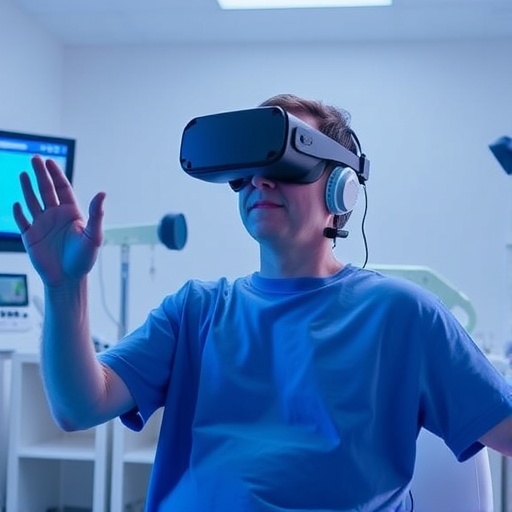In a groundbreaking pilot study from UCLA Health, virtual reality (VR) technology has emerged as a promising therapeutic intervention for psychological stress reduction in patients with cardiovascular disease or those at elevated risk. The emotional burden of living with or facing heart conditions has long been recognized as a compounding factor in disease progression, making innovative, non-pharmacological tools to mitigate stress especially valuable. This new research not only underscores VR’s potential to improve emotional well-being but also highlights physiological markers indicative of enhanced cardiac parasympathetic activity, supporting heart health.
Cardiovascular disease remains a leading cause of morbidity and mortality worldwide, with stress recognized as a pivotal, though often underappreciated, contributor to adverse cardiac outcomes. Chronic stress triggers a cascade of neuroendocrine responses, including heightened sympathetic nervous system activation and dysregulation of heart rate variability, which can accelerate disease progression and complicate recovery. Traditional interventions for stress management often face barriers such as accessibility, patient compliance, and variable efficacy. Here, virtual reality offers an immersive, engaging, and low-risk alternative that may bridge gaps in current behavioral cardiology practices.
The study enrolled twenty participants from UCLA’s cardiology clinic, selected based on their elevated psychological stress levels and cardiac risk profiles. Nearly half of the cohort had histories of anxiety or depression, comorbidities closely linked with cardiovascular disease and poor prognostic trajectories. The VR intervention consisted of a thirty-minute session immersing patients in vibrant, calming virtual environments enriched with harmonious auditory stimuli designed to promote relaxation and induce parasympathetic nervous system dominance.
.adsslot_u7hO89dWfi{width:728px !important;height:90px !important;}
@media(max-width:1199px){ .adsslot_u7hO89dWfi{width:468px !important;height:60px !important;}
}
@media(max-width:767px){ .adsslot_u7hO89dWfi{width:320px !important;height:50px !important;}
}
ADVERTISEMENT
Following the VR experience, patients reported profound psychological shifts, describing sensations akin to “floating” or becoming “detached” from everyday stressors, a psychological distancing thought to facilitate emotional regulation. Notably, participants frequently lost track of time during sessions, indicative of deep absorption and cognitive disengagement from stress-inducing thoughts—a phenomenon often elusive in conventional stress management techniques. Such subjective improvements dovetailed with objective physiological changes measured throughout the study.
These physiological shifts suggest that immersive VR experiences may stimulate the neurocardiac axis in ways that traditional interventions may not, offering patients a uniquely engaging mechanism to recalibrate autonomic balance favorably. By amplifying parasympathetic activity, VR could theoretically reduce systemic inflammation, improve endothelial function, and promote cardiac repair mechanisms, although further mechanistic studies are needed to elucidate these pathways comprehensively.
Dr. Tamara Horwich, cardiologist and professor at the David Geffen School of Medicine at UCLA, and corresponding author of this study, emphasized the potential paradigm shift VR represents in cardiac care. She noted, “At a time when we’re increasingly embracing new mind-heart-body approaches to care, this offers a safe, low-risk, and effective tool to support both emotional well-being and heart health.” This statement reflects an evolving understanding of cardiovascular disease management as requiring integrated biopsychosocial interventions beyond pharmacotherapy and interventional procedures.
Moreover, Dr. Horwich highlighted the often neglected but crucial role of behavioral cardiology. She stated, “Stress is a significant and under-addressed contributor to cardiovascular risk. Our study supports the broader use of behavioral cardiology tools like VR to complement traditional treatment, so patients feel calmer and more connected to their own healing process.” This holistic perspective invokes a shift toward patient-centered care paradigms that prioritize psychological factors as integral elements of cardiac rehabilitation and prevention.
Technically, the study employed an observational design, focusing on real-world feasibility and immediate effects of VR on stress parameters in a high-risk population. While the sample size was limited, the findings pave the way for larger, randomized controlled trials to assess long-term cardiovascular outcomes associated with regular VR therapy. The integration of immersive technology into clinical workflows could transform outpatient cardiology practices, providing clinicians with scalable, engaging adjunctive therapies that empower patients to actively participate in stress management.
It is noteworthy that this VR protocol combined visual and auditory stimuli specifically tailored to evoke relaxation responses, leveraging multisensory engagement to amplify therapeutic effects. The immersive landscapes included vivid colors and serene natural environments, elements recognized from prior neuroscience research to modulate limbic system activity and catalyze parasympathetic tone. Audio components consisted of soothing sounds and guided relaxation prompts, synergistically enhancing emotional regulation.
The implications of these findings extend beyond cardiology into broader medical disciplines where stress-induced autonomic dysregulation exacerbates disease states, such as oncology, chronic pain management, and mental health disorders. VR’s adaptability as a platform means tailored interventions could be developed to address a wide spectrum of psychosomatic illnesses, emphasizing the convergence of technology, neuroscience, and clinical care.
As healthcare increasingly adopts digital modalities, virtual reality exemplifies how immersive technology transcends entertainment to become a therapeutic tool with measurable impact. By harnessing neural plasticity and modulating autonomic circuits, VR offers a novel avenue for managing emotional stress, a key determinant of physical health outcomes. Continued innovation and rigorous evaluation will be critical to integrating such tools seamlessly into evidence-based clinical practice.
In conclusion, the UCLA Health pilot study represents a pioneering step in validating virtual reality as a biobehavioral intervention capable of reducing anxiety and modulating physiological markers linked to cardiovascular risk. As cardiovascular disease management embraces psychosocial dimensions, interventions like VR hold promise in improving patient quality of life and potentially influencing long-term cardiac health trajectories.
Subject of Research: People
Article Title: Novel Virtual Reality Intervention for Stress Reduction Among Patients with or At Risk for Cardiovascular Disease: Pilot Study
News Publication Date: 6-Aug-2025
Web References: https://doi.org/10.2196/66557
References: Journal of Medical Internet Research
Keywords: Virtual reality, Health and medicine
Tags: behavioral cardiology advancementscardiac patients and VR therapychronic stress and heart diseaseemotional well-being and heart healthimmersive technology in cardiologyinnovative non-pharmacological stress interventionsnon-invasive heart disease treatmentsphysiological markers of stress reliefpsychological stress in cardiovascular diseasetherapeutic VR applications for healthUCLA Health study on VRvirtual reality for stress reduction





